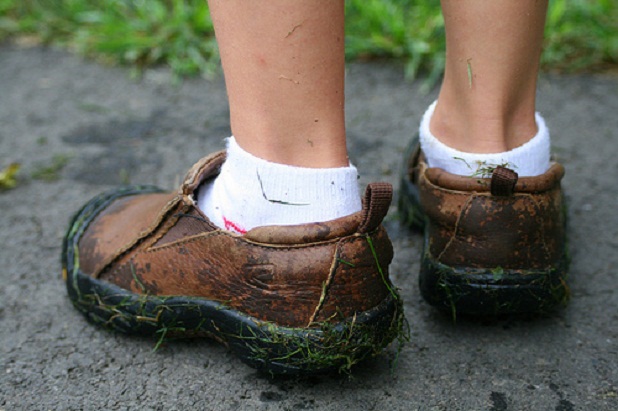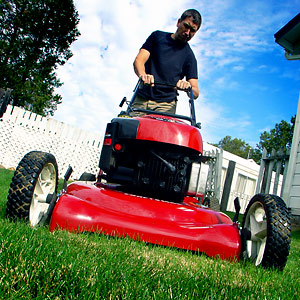Short Story
‘The ants’
New in Ceasefire, Short Stories - Posted on Sunday, October 10, 2010 3:15 - 3 Comments

By Dave Prescott
Stu lived in a white house with a wife called Betty. He was in the garden, pretending to mow the lawn.
“Prawns,” he said, out loud. If there was one thing in the world he couldn’t handle it was mowing the lawn. It did his head in. He didn’t know why. “Prawns, prawns, prawns, prawns, prawns. Sprawn sprawn sprawn sprawn sprawn sprawn.”
He pretend-mowed another strip. The grass was not just plain grass. It was in fact a mixture of different types of grasses (there were people in the world, he knew, who could identify any given type of grass at a moment’s notice), clover, speedwells, dandelions, daisies and the odd weed. Below all this vegetative palaver frolicked ants.
The mower had not worked properly since 1967 but he kept pushing it up and down regardless, because it gave the illusion of a tidy lawn while leaving the ecosystems below largely intact. Because the garden, like all gardens, was trying to turn back to grass, bracken and trees, which was the natural state of open ground in that part of the country.
Of course, that is relative. It is hard to know what is natural anymore, particularly when you have people like Stu pretend-mowing his lawn and causing all kinds of chains of events without knowing it. In a way Stu – made as he was from materials as old as the universe – is just as much a part of nature as the ants he was trying not to squash, so who are we to judge?
???
Then Betty was outside watching Stu pretending to mow the lawn. She knew he was only pretending but had thought about the consequences of insisting that he mow the lawn ‘properly’ (she herself could not undertake the task because her hay fever would flare up immediately) and decided that, on balance, she didn’t mind a flattened lawn as opposed to a mowed one.
“I think a barbecue tonight, Stu,” she said. Stu nodded his agreement.
“But we need to do something about these ants,” she said. The paving slabs between the garden and the house were crawling with red ants. When you went out there of a summer evening just trying to enjoy a barbecue, your feet were bitten to within millimetres of their lives, if feet can be said to have lives, by hungry ants. Betty went into the house and came out with some powder. Stu watched as she poured the deadly powder into the cracks between the slabs, and in the cracks between the slabs and the weeds, as was the case in places.
???
Leaving the mower alone for a moment Stu approached Betty. They had been married for 12 years. He grabbed the bottle of powder and tried to wrest it from her hand. When that failed he tried to wrestle it from her hand.
“What are you doing?” said Betty, releasing the bottle after a moment’s struggle. She knew all there was to know about Stu that could be gleaned without actually being inside his body and mind.
“I’ve decided to be anti-death from now on.”
“Anti-death? Anti-death in what sense?”
“How many senses are there?”
“Five, I think. Or six. Depending.”
“So which one?”
“I was asking you that.”
“I don’t know.”
They paused and Stu looked at the bottle, as if all of the answers to the world’s problems could be found thereon – in particular a politically-acceptable solution to reducing the global population through existing governance frameworks – but it was just a bottle of anti-ant powder, and besides who can say for sure if it’s a bad thing that three billion people will die because they can’t get their act together and put in place some effective systems of global governance? Certainly not Stu, Stu thought, thinking of himself in the third person. Future historians will say we had it coming, Stu thought. They will point to causes both proximate and ultimate and say, given these circumstances, how could you have failed to act to prevent this worldwide disaster? And for a few centuries these historians and the people around them will live carefully, until population growth starts all over again and then there will be further doom. And so forth, reasoned Stu.

But it’s not a bad thing or a good thing, reflected Stu as he continued to look at the bottle of powder while Betty looked at the side of his face. It’s just a thing. Not that it won’t be eternally horrific for generations to come for the families of those three billion people who die in the conflicts over access to dwindling supplies of energy, food, and clean water, of course it will, but let’s get things in perspective here, cautioned Stu to the voices in his head. A few hundred thousand years down the line the human population will have recovered and no one will even remember that half the world once died during a decade of preventable insanity. No one’s banging a drum here. Who knows what is wrong and what is right.
“Certainly it’s not my job to know,” thought Stu. Stu’s job, he thought – standing there, with a headache, worried about giving his wife a headache – is to ask the right questions, not to provide answers. And so he looked up at Betty with a grin like a drunkard’s.
“Well you can’t be completely anti-death,” said Betty. “We’ve all got to die sometime. Unless you are talking cryogenics. Or are you a freaking Buddhist now or something?”
“I’m not talking cryogenics, no,” said Stu. “And I’m not a freaking Buddhist. It’s just that, why do ants have to die just so that we can wear sandals? We might as well wear shoes. This country is too cold to wear sandals in the evening. For now. But who knows. Maybe one day things will change. Then, perhaps, we can kill the ants.”
“Are you having a mid-life crisis?” said Betty, who thought she might as well just come out and say what everyone was thinking.
“Perhaps I am. Perhaps I am,” said Stu, looking at the ants. “Perhaps I am.”
???
Just then, a package arrived.
“Well aren’t you going to open it?”
“Give me a chance, woman.”
Inside was a set of six handmade scotch eggs cocooned in special cool-wrap originally designed by NASA for use in packed lunches on the moon.
“Oh wonderful. Oh that’s just fine. I’d forgotten I ordered these. Don’t you love it when that happens? Don’t you love getting packages in the post? Isn’t it like receiving a present?”
Right there and then Stu tucked into a scotch egg. Pretty soon Betty joined him. Stu’s egg consisted of free-range meat, grated root ginger and diced apricots, all spiced with cinnamon, fennel, star anise and cloves. He could really taste the star anise.
“Oh my god, you can really taste the star anise in this egg,” he told Betty.
Betty’s egg contained free-range meat with hot Moroccan harrisa, smoked paprika, diced red chillies and dark chocolate chips. The chocolate chips were 70% cocoa. They ate their eggs in silence. Stu looked at the ants, and the grass, as he chewed. There was something. He had forgotten what.
Dave Prescott is a writer and consultant. He lives in the countryside.
3 Comments
joyce
Ceasefire Magazine – This week in Ceasefire
[…] Short Story […]
Corin Faife
Beckett would like the retreat to absurdism in response to the primal forces of life.
And, maybe, the Scotch eggs.


brilliant story, really enjoyed reading it. reminded me of alan bennett (with perhaps a hint of beckett?) thanks for this